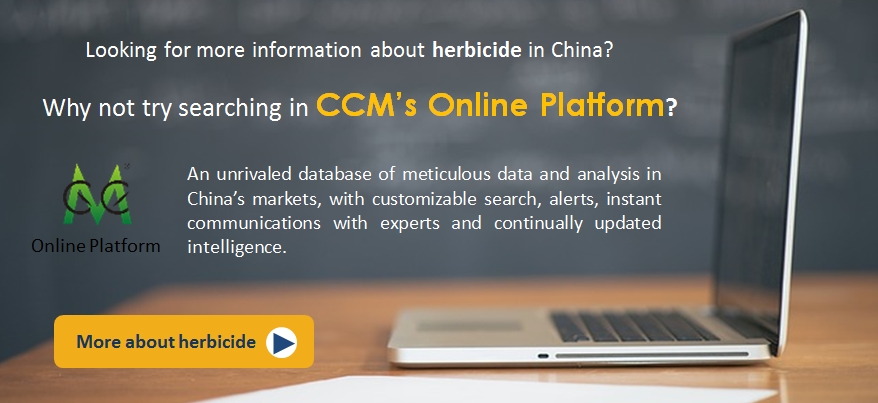In 2015, China's pesticide industry remained in bad shape with slowly
grew profit and increased number of enterprises at loss. Paraquat and glyphosate,
two major products in the herbicide market were thwarted. Dicamba and glufosinate-ammonium became
dark horses.
Reviewing the year of 2015, China's pesticide industry was in the doldrums as a
whole - profit grew slowly and the number of enterprises at loss increased.
Notably, herbicide market became the worst-hit market that dragged down the
pesticide industry. Particularly, large-tonnage herbicides include glyphosate and paraquat that
occupy large shares in the herbicide market performed even worse, which was to
blame for the downturn of the whole market.
This directly led to declining
economic benefit. Only a few herbicides like dicamba and glufosinate-ammonium enjoyed
good market condition. In 2015, the export volume of dicamba TC and glufosinate-ammonium TC realized
large growth of over 100% respectively, according to data analysis from CCM.

- Revenue and profit grew slowly, number of enterprises at loss further
increased
According to data from the National Bureau of Statistics of the People's
Republic of China (NBS), in Jan.-Nov. 2015, the revenue from main business
of China's pesticide industry reached USD43.24 billion (RMB281.17 billion), a YoY rise
of 5.7%; the YoY rise was 8.3% in the same period of 2014. And the
total profit was USD3.01 billion (RMB19.58 billion), a YoY rise of
5.1%; the YoY rise was 1.3% in the same period of 2014.
Although the YoY rise
in total profit in 2015 was higher than that in 2014, the number of pesticide
enterprises at loss in 2015 recorded a YoY increase of 2.7%. The
whole industry made a loss of USD118.40 million (RMB770million), up 62.2% year
on year. Also, the loss by scale (loss by scale=number of enterprise at
loss/total number of enterprise) increased by 0.3 percentage point year on
year.
In 2015, China's major paraquat and glyphosate manufacturers
all recorded different degrees' of declines in their revenue and total profit
due to the weak market demand and dropping prices.
- Paraquat and glyphosate markets were frustrated
In 2015, China's prohibition policy on paraquat AS and paraquat being
classified as a highly poisonous substance overshadowed the development
prospect of paraquat in China. Domestic formulation processing
enterprises almost demand no more paraquat TK. In particular, the
development progress of non-AS paraquat slowed down and even
stagnated. Domestic paraquat TK is mainly for overseas markets.
However, the purchase volume did not rise largely in overseas markets.
Glyphosate market was also suffering in 2015. After being use in a large
quantity for a long time, glyphosate resistance becomes more and more
obvious. Part of market share of glyphosate is facing the risk of
being replaced by other herbicides. Meantime, that glyphosate may
causes cancer makes it highly-controversial on whether it can continue to be
used. Some countries/regions even have suspended or banned the use
ofglyphosate.

About CCM:
CCM is the leading market intelligence
provider for China's agriculture, chemicals, food & ingredients and life
science markets. Founded in 2001, CCM offers a range of data and content
solutions, from price and trade data to industry newsletters and customized
market research reports. Our clients include Monsanto, DuPont, Shell, Bayer,
and Syngenta. CCM is a brand of Kcomber Inc.
For more information about CCM, please
visit www.cnchemicals.com or
get in touch with us directly by emailing econtact@cnchemicals.com or
calling +86-20-37616606.
Tag: pesticide, herbicide